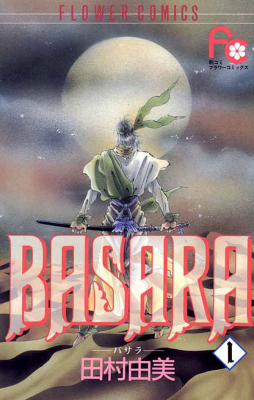Several times, I couldn't get far when I tried to read this series. The first few volumes absolutely drowns you in death, tragedy, doomed love and the occasional bad decision. The prospect of reading 27 volumes in the same vein felt off-putting, to put it mildly. As a huge fan of 7 Seeds from the same author though, I finally mustered the courage to read through it, and fortunately, it turned out that it wasn't 27 volumes of the tragic lovers adding to one another's list of grievances.
To those of you who initially felt the same as me: don't be put off. There is still plenty of drama, of course, and at times you'd really feel like slapping a character or two. Sarasa and Shuri vow to destroy each other, but must also confront many other challenges along the way. Losses are inevitable. Yet these extremely tall walls become the very stepping stones towards an incredible odyssey of personal development and uprising all across the country, taking the protagonists across numerous regions in Japan, and allowing the readers to enjoy a rich story that explores themes like politics and corruption of course, but also governance methods, trade, irrigation, journalism, art, slavery, plenty of family drama, and different sorts of introspection.
As Sarasa gathers allies and learns more about the world, she is also forced to rethink and look beyond her revenge to what she truly wishes to accomplish for the country. Shuri, meanwhile, is forced to look beyond his ambitions to topple his father and siblings, and truly confront the losses caused by his actions, both to himself and to others. Their romance, which may have felt overbearing at first, actually develops greatly, into something quite touching. Their growth is possible Because they must confront pain and loss, both those they felt themselves and those they have caused others.
And they don't do this alone. The series is supported by an amazing cast, each with unique personalities and backgrounds. There are the brave, the strong, the intelligent and the wise, but also the weak. There are those who fight at the frontlines, those who work in the shadows, those who expose the truth, those who reform or conspire from within, those who lead by example, even farmers, builders and healers striving towards a better tomorrow. These aren't characters that were just sitting around, twiddling their fingers and waiting for a savior. The whole country was ready for change well before Sarasa showed up. Nor do they coddle the supposed 'saviors.' Far from it: they can tell weakness, and they can tell hot air. And they are the ones who force the main characters to think about what it is they truly aim to achieve, as well as what sacrifices they are willing to make.
In the end, the survivors will have to live with scars and burdens, as well as difficulties that are only starting. And yet, they never stop struggling towards a better tomorrow. And somehow, I found that to be the most satisfying conclusion.
I'd like to point out that this is a mostly realistic fantasy, but fantasy nonetheless. There is no magic nor mystical creatures, but there is a strong notion of fate throughout the series, complete with too-well-timed natural events and encounters. Accepting this instead of nitpicking over the coincidences will allow you to enjoy the story more fully. Some people don't like the art, and I didn't enjoy the same artstyle with 7 Seeds at first, but with time I realized how rich and expressive it is.
Speaking of 7 Seeds, I've seen a few people compare 7 Seeds and Basara, but what really surprised me was how Different the two series are. Basara focuses more on romance and personal character development (for several key characters) in a setting of wars, politics, governance and related themes (trade, slavery, etc.). 7 Seeds focuses more on group dynamics (individual character development is more spread out compared to Basara) and psychology (some of the best I've seen anywhere) in a setting of survival (different strategies humanity considered against the impeding doom, differing strategies of survival used by the different teams). The things you love in one may not be present in the other, but both are magnificent works in their own rights.





